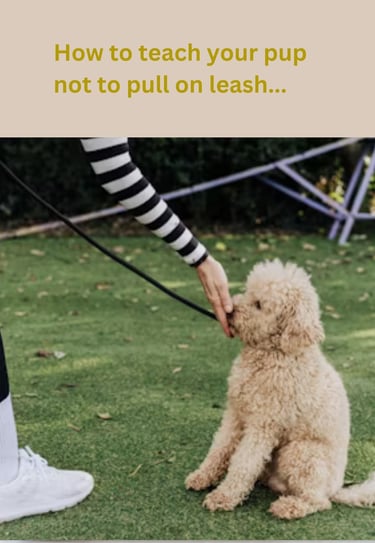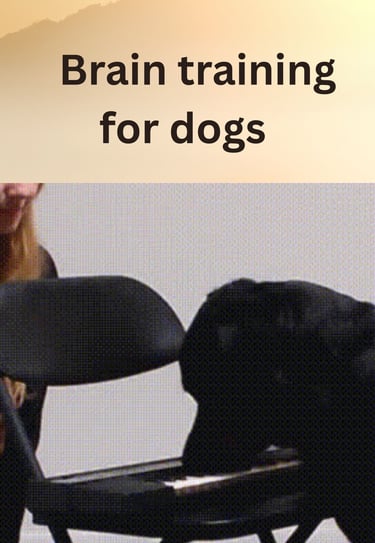Advanced Techniques for Elevating Your Puppy’s Training Skills
Discover essential strategies and tips for effective puppy training. From mastering socialization skills to understanding the lifelong commitment to training, our blog provides valuable insights to help you nurture your puppy's obedience and overall well-being.


Advanced Techniques for Elevating Your Puppy's Training Skills**
Welcoming a new puppy into your home can be an exciting and rewarding experience. However, it also comes with a significant amount of responsibility, particularly when it comes to training.
Effective puppy training is crucial for developing good behavior, preventing unwanted habits, and strengthening the bond between you and your furry friend.
In this article, we'll explore essential strategies and tips for elevating your puppy's training skills, from mastering socialization skills to understanding the lifelong commitment to training.
The Importance of Socialization
Socialization is a critical aspect of puppy training that involves exposing your puppy to various environments, people, animals, and experiences.
This helps your puppy develop confidence, calmness, and good manners in the face of new and potentially overwhelming situations. Proper socialization can prevent fear-based behaviors, aggression, and anxiety disorders.
To socialize your puppy effectively:
1. Start early: Begin socialization as early as8-10 weeks old, when puppies are most receptive to new experiences.
2. Be consistent: Regularly expose your puppy to new environments, people, and animals.
3. Keep it positive: Ensure that socialization experiences are positive and enjoyable for your puppy.
4. Gradually increase exposure: Gradually increase the intensity and duration of socialization experiences.
Some effective socialization techniques include:
1. Puppy classes: Enroll your puppy in puppy classes to interact with other puppies and people.
2. Outdoor exposure: Take your puppy on regular walks and outings to expose them to new environments and stimuli.
3. Handling exercises: Gently handle your puppy's paws, ears, and tail to help them become comfortable with touch.
Positive Reinforcement Training
Positive reinforcement training is a highly effective and humane approach to puppy training. This method focuses on rewarding desired behaviors, rather than punishing undesired ones. By using positive reinforcement techniques, you can:
1. Encourage good behavior: Reward your puppy for exhibiting desired behaviors, such as sitting or staying.
2. Build trust: Develop a strong bond with your puppy based on trust, respect, and clear communication.
3. Reduce stress: Minimize stress and anxiety associated with punishment-based training methods.
To implement positive reinforcement training:
1. Use high-value rewards: Utilize high-value treats, praise, and affection to motivate your puppy.
2. Be consistent: Consistently reward desired behaviors.
3. Phase out rewards: Gradually phase out rewards as your puppy becomes more proficient in a behavior.
Some effective positive reinforcement techniques include:
1. Clicker training: Use a clicker to mark desired behaviors and reward with treats.
2. Target training: Use a target stick to guide your puppy into desired positions.
3. Shaping: Gradually build complex behaviors by reinforcing small steps.
Advanced Training Techniques
Once your puppy has mastered basic obedience commands, it's time to introduce advanced training techniques. These techniques can help:
1. Improve focus: Enhance your puppy's ability to focus and concentrate.
2. Increase complexity: Gradually increase the complexity of training exercises.
3. Enhance problem-solving skills: Encourage problem-solving and critical thinking.
Some advanced training techniques include:
1. Chaining: Combine multiple behaviors to create a complex sequence.
2. Back-chaining: Train a complex behavior by starting with the final step and working backwards.
3. Distance training: Train your puppy to respond to commands at a distance.
Lifelong Commitment to Training
Puppy training is a lifelong commitment that requires patience, consistency, and dedication. As your puppy grows and matures, their training needs will evolve. To ensure ongoing success:
1. Stay consistent: Maintain a consistent training routine.
2. Continuously reinforce: Continuously reinforce previously learned behaviors.
3. Introduce new challenges: Gradually introduce new challenges and complexities to keep your puppy engaged.
Some tips for maintaining a lifelong commitment to training include:
1. Set realistic goals: Set achievable training goals and celebrate successes.
2. Seek professional help: Consult with a professional dog trainer or behaviorist if you encounter challenges.
3. Stay patient: Remain patient and calm, even in the face of setbacks or challenges.
Common Challenges and Solutions
Puppy training can be challenging, but with the right strategies and techniques, you can overcome common obstacles. Some common challenges and solutions include:
1. Housebreaking: Establish a consistent routine, use positive reinforcement, and be patient.
2. Barking and chewing: Redirect attention, provide adequate exercise and mental stimulation, and use positive reinforcement.
3. Separation anxiety: Gradually increase alone time, provide a comfortable environment, and use positive reinforcement.
Additional Tips and Resources
For additional support and guidance, consider the following resources:
1. Professional dog training: Consult with a professional dog trainer or behaviorist for personalized guidance.
2. Online training resources: Utilize online training resources, such as video tutorials and training blogs.
3. Puppy training classes: Enroll in puppy training classes to interact with other puppies and receive guidance from experienced trainers.
The Benefits of Advanced Training
Advanced training can have numerous benefits for your puppy, including:
1. Improved obedience: Enhance your puppy's ability to respond to commands and behave in a variety of situations.
2. Increased confidence: Boost your puppy's confidence and self-esteem through positive reinforcement and socialization.
3. Stronger bond: Develop a stronger bond with your puppy based on trust, respect, and clear communication.
Conclusion
Elevating your puppy's training skills requires a comprehensive approach that incorporates socialization, positive reinforcement training, and advanced techniques. By understanding the importance of socialization, using positive reinforcement training methods, and introducing advanced techniques, you can help your puppy develop into a well-behaved and well-adjusted adult dog.
Remember, puppy training is a lifelong commitment that requires patience, consistency, and dedication. With the right strategies and techniques, you can nurture your puppy's obedience and overall well-being, setting them up for a happy and healthy life.
By following these tips and staying committed to your puppy's training, you can:
1. Develop a strong bond: Build a lifelong bond with your puppy based on trust, respect, and clear communication.
2. Improve behavior: Enhance your puppy's behavior and responsiveness to commands.
3. Enhance well-being: Promote your puppy's overall well-being and happiness.













